Aspirin or heparin or both for improving pregnancy outcomes in women with persistent antiphospholipid antibodies and recurrent pregnancy loss
- PMID: 32358837
- PMCID: PMC7195627
- DOI: 10.1002/14651858.CD012852.pub2
Aspirin or heparin or both for improving pregnancy outcomes in women with persistent antiphospholipid antibodies and recurrent pregnancy loss
Abstract
Background: Aspirin and heparin are widely used as preventive strategy to reduce the high risk of recurrent pregnancy loss in women with antiphospholipid antibodies (aPL). This review supersedes a previous, out-of-date review that evaluated all potential therapies for preventing recurrent pregnancy loss in women with aPL. The current review focusses on a narrower scope because current clinical practice is restricted to using aspirin or heparins, or both for women with aPL in an attempt to reduce pregnancy complications.
Objectives: To assess the effects of aspirin or heparin, or both for improving pregnancy outcomes in women with persistent (on two separate occasions) aPL, either lupus anticoagulant (LAC), anticardiolipin (aCL) or aβ2-glycoprotein-I antibodies (aβ2GPI) or a combination, and recurrent pregnancy loss (two or more, which do not have to be consecutive).
Search methods: We searched Cochrane Pregnancy and Childbirth's Trials Register, ClinicalTrials.gov, the WHO International Clinical Trials Registry Platform (ICTRP) (3 June 2019), and reference lists of retrieved studies. Where necessary, we attempted to contact trial authors.
Selection criteria: Randomised, cluster-randomised and quasi-randomised controlled trials that assess the effects of aspirin, heparin (either low-molecular-weight heparin (LMWH) or unfractionated heparin (UFH]), or a combination of aspirin and heparin compared with no treatment, placebo or another, on pregnancy outcomes in women with persistent aPL and recurrent pregnancy loss were eligible. All treatment regimens were considered.
Data collection and analysis: Two review authors independently assessed trials for inclusion criteria and risk of bias. Two review authors independently extracted data and checked them for accuracy and the certainty of the evidence was assessed using the GRADE approach.
Main results: Eleven studies (1672 women) met the inclusion criteria; nine randomised controlled trials and two quasi-RCTs. The studies were conducted in the USA, Canada, UK, China, New Zealand, Iraq and Egypt. One included trial involved 1015 women, all other included trials had considerably lower numbers of participants (i.e. 141 women or fewer). Some studies had high risk of selection and attrition bias, and many did not include sufficient information to judge the risk of reporting bias. Overall, the certainty of evidence is low to very low due to the small numbers of women in the studies and to the risk of bias. The dose and type of heparin and aspirin varied among studies. One study compared aspirin alone with placebo; no studies compared heparin alone with placebo and there were no trials that had a no treatment comparator arm during pregnancy; five studies explored the efficacy of heparin (either UFH or LMWH) combined with aspirin compared with aspirin alone; one trial compared LMWH with aspirin; two trials compared the combination of LMWH plus aspirin with the combination of UFH plus aspirin; two studies evaluated the combination of different doses of heparin combined with aspirin. All trials used aspirin at a low dose. Aspirin versus placebo We are very uncertain if aspirin has any effect on live birth compared to placebo (risk ratio (RR) 0.94, 95% confidence interval (CI) 0.71 to 1.25, 1 trial, 40 women, very low-certainty evidence). We are very uncertain if aspirin has any effect on the risk of pre-eclampsia, pregnancy loss, preterm delivery of a live infant, intrauterine growth restriction or adverse events in the child, compared to placebo. We are very uncertain if aspirin has any effect on adverse events (bleeding) in the mother compared with placebo (RR 1.29, 95% CI 0.60 to 2.77, 1 study, 40 women). The certainty of evidence for these outcomes is very low because of imprecision, due to the low numbers of women involved and the wide 95% CIs, and also because of risk of bias. Venous thromboembolism and arterial thromboembolism were not reported in the included studies. Heparin plus aspirin versus aspirin alone Heparin plus aspirin may increase the number of live births (RR 1.27, 95% CI 1.09 to 1.49, 5 studies, 1295 women, low-certainty evidence). We are uncertain if heparin plus aspirin has any effect on the risk of pre-eclampsia, preterm delivery of a live infant, or intrauterine growth restriction, compared with aspirin alone because of risk of bias and imprecision due to the low numbers of women involved and the wide 95% CIs. We are very uncertain if heparin plus aspirin has any effect on adverse events (bleeding) in the mother compared with aspirin alone (RR 1.65, 95% CI 0.19 to 14.03, 1 study, 31 women). No women in either the heparin plus aspirin group or the aspirin alone group had heparin-induced thrombocytopenia, allergic reactions, or venous or arterial thromboembolism. Similarly, no infants had congenital malformations. Heparin plus aspirin may reduce the risk of pregnancy loss (RR 0.48, 95% CI 0.32 to 0.71, 5 studies, 1295 women, low-certainty evidence). When comparing LMWH plus aspirin versus aspirin alone the pooled RR for live birth was 1.20 (95% CI 1.04 to 1.38, 3 trials, 1155 women). In the comparison of UFH plus aspirin versus aspirin alone, the RR for live birth was 1.74 (95% CI 1.28 to 2.35, 2 trials, 140 women).
Authors' conclusions: The combination of heparin (UFH or LMWH) plus aspirin during the course of pregnancy may increase live birth rate in women with persistent aPL when compared with aspirin treatment alone. The observed beneficial effect of heparin was driven by one large study in which LMWH plus aspirin was compared with aspirin alone. Adverse events were frequently not, or not uniformly, reported in the included studies. More research is needed in this area in order to further evaluate potential risks and benefits of this treatment strategy, especially among women with aPL and recurrent pregnancy loss, to gain consensus on the ideal prevention for recurrent pregnancy loss, based on a risk profile.
Trial registration: ClinicalTrials.gov NCT01051778 NCT00564174 NCT01661439 NCT00180778 NCT02144064 NCT00467363 NCT00959621 NCT02303171 NCT03100123.
Copyright © 2020 The Cochrane Collaboration. Published by John Wiley & Sons, Ltd.
Conflict of interest statement
Eva N Hamulyák: none known
Luuk JJ Scheres: is a PhD‐candidate of the CREW project (2013T083) funded by the Netherlands Heart Foundation
Mauritia C Marijnen: none known
Mariette Goddijn: has received travel expenses from European Society of Human Reproduction and Embryology regarding Executive Committee work (Amsterdam‐Brussels) until july 2019. She works at both locations of the Department of Reproductive Medicine of the Amsterdam UMC (Location AMC and location VUMC). Location VUMC has received several research and educational grants from Guerbet, Merck and Ferring, outside the scope of the submitted work.
Saskia Middeldorp has received a Netherlands Organisation for Scientific Research (NWO) personal Innovation VIDI grant (paid to her institution) on Thrombophilia and Reproduction from the Netherlands Organisation for Scientific Research (NWO). She has carried out paid consultancy (paid to her institution, and not in relation to this review) for Daiichi Sankyo (as a member of the Writing Committee of the Hokusai VTE study (published in 2013)); Daiichi Sankyo, Bayer, and Janssen (local investigator for various treatment and prophylaxis studies in VTE patients). She has received payment (to her institution) for lectures on VTE treatment from Bayer, BMS/Pfizer, Boehringer Ingelheim, Daiichi Sankyo, Sanofi, and for developing educational presentations for Bayer, Aspen, Daiichi Sankyo, BMS/Pfizer). Saskia also has grants/grants for investigator‐initiated studies from Aspen, Daiichi Sankyo and Bayer, all paid to her institution.
Figures
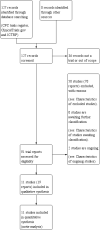
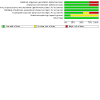
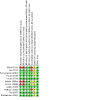
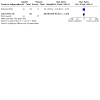
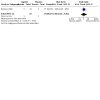
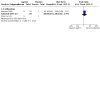
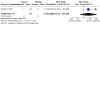

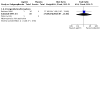
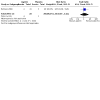
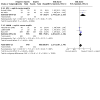
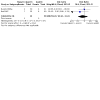
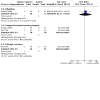
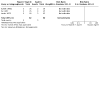
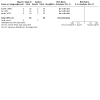

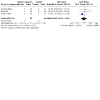

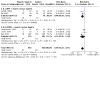
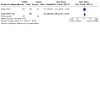

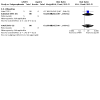
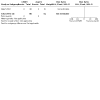
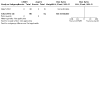
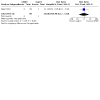
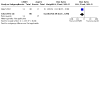
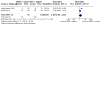
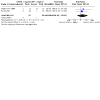
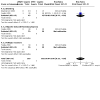

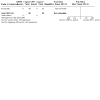
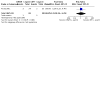

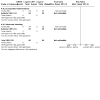
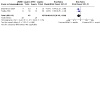
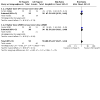
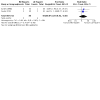
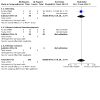
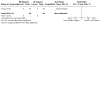
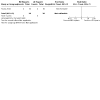
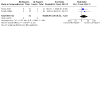
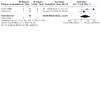
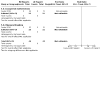
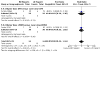
Update of
References
References to studies included in this review
Alalaf 2012 {published data only}
Bao 2017 {published data only}
-
- Bao SH, Zhou Q, Frempong ST, Tu WY, Sheng SL, Liao H. Use of d-dimer measurement to guide anticoagulant treatment in recurrent pregnancy loss associated with antiphospholipid syndrome. American Journal of Reproductive Immunology 2017; 78(6):e12770. - PubMed
Farquharson 2002 {published data only}ISRCTN55179279
-
- Farquharson R, ISRCTN55179279. Antiphospholipid syndrome in pregnancy: a controlled treatment trial. www.isrctn.com/ISRCTN55179279 (first received 23 January 2004).
-
- Farquharson RG, Quenby S, Greaves M. Antiphospholipid syndrome in pregnancy: a randomized, controlled trial of treatment. Obstetrics & Gynecology 2002; 100:408-13. - PubMed
-
- Farquharson RG. Antiphospholipid syndrome in pregnancy: a controlled treatment trial. Journal of Obstetrics and Gynaecology 2001; 21 Suppl 1:S22.
Fouda 2010 {published data only}
-
- Fouda UM, Sayed AM, Ramadan DI, Fouda IM. Efficacy and safety of two doses of low molecular weight heparin (enoxaparin) in pregnant women with a history of recurrent abortion secondary to antiphospholipid syndrome. Journal of Obstetrics and Gynaecology 2010; 30(8):842-6. - PubMed
Fouda 2011 {published data only}
-
- Fouda UM, Sayed AM, Abdou AM, Ramadan DI, Fouda IM, Zaki MM. Enoxaparin versus unfractionated heparin in the management of recurrent abortion secondary to antiphospholipid syndrome. International Journal of Gynecology & Obstetrics 2011; 112(3):211-5. [ClinicalTrials.gov: NCT01051778]] - PubMed
-
- NCT01051778. Low-molecular-weight heparin (LMWH) versus unfractionated heparin (UFH) in pregnant women with history of recurrent abortion secondary to antiphospholipid syndrome. clinicaltrials.gov/ct2/show/results/NCT01051778 (first received 20 January 2010).
Kutteh 1996a {published data only}
-
- Kutteh WH. Antiphospholipid antibody-associated recurrent pregnancy loss: treatment with heparin and low-dose aspirin is superior to low-dose aspirin alone. American Journal of Obstetrics and Gynecology 1996; 174(5):1584-9. - PubMed
Kutteh 1996b {published data only}
-
- Kutteh WH, Ermel LD. A clinical trial for the treatment of antiphospholipid antibody-associated recurrent pregnancy loss with lower dose heparin and aspirin. American Journal of Reproductive Immunology 1996; 35:402-7. - PubMed
Laskin 2009 {published data only}
-
- Laskin CA, NCT00564174. A randomized controlled trial comparing low molecular weight heparin and aspirin to aspirin alone in women with unexplained recurrent pregnancy loss. clinicaltrials.gov/ct2/show/NCT00564174 (first received 27 November 2007).
-
- Laskin CA, Spitzer KA, Clark CA, Crowther MR, Ginsberg JS, Hawker GA, et al. Low molecular weight heparin and aspirin for recurrent pregnancy loss: results from the randomized, controlled HepASA Trial. Journal of Rheumatology 2009; 36(2):279-87. - PubMed
Pattison 2000 {published data only}
-
- Pattison NS, Chamley LW, Birdsall M, Zanderigo AM, Liddell HS, McDougall J. Does aspirin have a role in improving pregnancy outcome for women with the antiphospholipid syndrome? A randomized controlled trial. American Journal of Obstetrics and Gynecology 2000; 183:1008-12. - PubMed
Rai 1997 {published data only}
-
- Cohen H. Randomized trial of aspirin versus aspirin and heparin in pregnant women with the antiphospholipid syndrome. Annales de Medecine Interne 1996; 147 Suppl 1:44. - PubMed
-
- Rai R, Regan L. Antiphospholipid antibodies and recurrent miscarriage. Acta Obstetricia et Gynecologica Scandinavica 1997; 76(Suppl(167:4)):6.
-
- Rai RS, Cohen H, Regan L. Prospective randomized trial of aspirin versus aspirin + heparin in pregnant women with a history of recurrent miscarriage in association with antiphospholipid antibodies. Human Reproduction 1996; 11:25.
-
- Rai RS, Regan L, Dave M, Cohen H. Prospective randomised trial of aspirin versus aspirin plus heparin in pregnant women with the antiphospholipid syndrome [abstract]. British Journal of Haematology 1996; 93(Suppl 1):5.
Stephenson 2004 {published data only}
-
- Stephenson MD, Ballem PJ, Tsang P, Purkiss S, Ensworth S, Houlihan E, et al. Treatment of antiphospholipid antibody syndrome (aps) in pregnancy: a randomized pilot trial comparing low molecular weight heparin to unfractionated heparin. Journal of Obstetrics & Gynaecology Canada: JOGC 2004; 26(8):729-34. - PubMed
References to studies excluded from this review
Agarwal 2018 {published data only}
-
- Agarwal N, CTRI/2018/04/013167. Screening for inherited thrombophilia in recurrent pregnancy loss and role of therapy with aspirin and low molecular weight heparin (LMWH). ctri.nic.in/Clinicaltrials/pmaindet2.php?trialid=22008 (first received 11 April 2018).
Branch 2000 {published data only}
-
- Branch DW, Peaceman AM, Druzin M, Silver RK, El-Sayed Y, Silver RM, et al, for the Pregnancy Loss Study Group. A multicenter, placebo-controlled pilot study of intravenous immune globulin treatment of antiphospholipid syndrome during pregnancy. American Journal of Obstetrics and Gynecology 2000; 182(1 Pt 1):122-7. - PubMed
Bu 2009 {published data only}
-
- Bu MX. Clinical observation 40 autoimmune habitual abortion patients with low molecular weight heparin calcium. China Practical Medicine 2009; 4:73-4.
Carta 2005 {published data only}
-
- Carta G, Iovenitti P, Falciglia K. Recurrent miscarriage associated with antiphospholipid antibodies: prophylactic treatment with low-dose aspirin and fish oil derivates. Clinical & Experimental Obstetrics & Gynecology 2005; 32(1):49-51. - PubMed
Christiansen 1995 {published data only}
-
- Christiansen OB, Mathiesen O, Husth M, Rasmussen KL, Ingerslev HJ, Lauritsen JG, et al. Placebo-controlled trial of treatment of unexplained secondary recurrent spontaneous abortions and recurrent late spontaneous abortions with iv immunoglobulin. Human Reproduction 1995; 10:2690-5. - PubMed
Clark 2009 {published data only}
-
- Clark CA, Spitzer KA, Laskin CA. Longterm follow-up of asa/p trial participants: no evidence of thrombotic sequelae 20 years after anti-phospholipid-associated recurrent pregnancy loss. Arthritis and Rheumatism 2009; 60(Suppl 10):1283.
Cowchock 1992 {published data only}
-
- Cowchock FS, Reece EA, Balaban D, Ware D, Plouffe L. Repeated fetal losses associated with antiphospholipid antibodies: a collaborative randomized trial comparing prednisone with low-dose heparin treatment. American Journal of Obstetrics and Gynecology 1992; 166:1318-23. - PubMed
Cowchock 1997 {published data only}
-
- Cowchock S, Reece EA. Do low-risk pregnant women with antiphospholipid antibodies need to be treated? Organizing Group of the Antiphospholipid Antibody Treatment Trial. American Journal of Obstetrics and Gynecology 1997; 176(5):1099-100. - PubMed
Dendrinos 2007 {published data only}
-
- Dendrinos S, Kalogirou I, Makrakis E, Theodoridis T, Mahmound EA, Christopoulou-Cokkinou V, et al. Safety and effectiveness of tinzaparin sodium in the management of recurrent pregnancy loss. Clinical and Experimental Obstetrics and Gynecology 2007; 34(3):143-5. - PubMed
Dendrinos 2009 {published data only}
-
- Dendrinos S, Sakkas E, Makrakis E. Low-molecular-weight heparin versus intravenous immunoglobulin for recurrent abortion associated with antiphospholipid antibody syndrome. International Journal of Gynecology & Obstetrics 2009; 104(3):223-5. - PubMed
De Veciana 2001 {published data only}
-
- De Veciana M, Trail P, Dattel B, Slotnick RN, Abuhamad A. Dalteparin versus unfractionated heparin for prophylactic anticoagulation during pregnancy [abstract]. American Journal of Obstetrics and Gynecology 2001; 185(6 Suppl):S182.
De Vries 2012 {published data only}
-
- Vries JI, Pampus MG, Hague WM, Bezemer PD, Joosten JH, FRUIT Investigators. Low-molecular-weight heparin added to aspirin in the prevention of recurrent early-onset pre-eclampsia in women with inheritable thrombophilia: the FRUIT-RCT. Journal of Thrombosis and Haemostasis 2012; 10(1):64-72. - PubMed
-
- Hoorn M, Hague WM, Pampus MG, Bezemer P. Low-molecular-weight heparin added to aspirin in the prevention of recurrent early-onset preeclampsia in women with antiphospholipid antibodies. Journal of Thrombosis and Haemostasis 2013; 11(Suppl 2):435.
Eid 2019 {published data only}
-
- Eid MI, Abdelhafez MS, El-Refaie W, El-Zayadi AA, Samir K, Abdelrazik MM, et al. Timing of initiation of low molecular weight heparin administration in pregnant women with antiphospholipid syndrome: a randomized clinical trial of efficacy and safety. International Journal of Women's Health 2019; 11:41-7. [DOI: 10.2147/IJWH.S193293] - DOI - PMC - PubMed
Ensom 2004 {published data only}
-
- Ensom MH, Stephenson MD. Pharmacokinetics of low molecular weight heparin and unfractionated heparin in pregnancy. Journal of the Society for Gynecologic Investigation 2004; 11(6):377-83. - PubMed
Fu 2004 {published data only}
-
- Fu JH, Wang ZY, Lang FF. Study of heparin on pregnant woman with recurrent pregnant loss and positive anti-phospholipid antibody. Chinese Journal of Perinatal Medicine 2004; 7:276-8.
Geva 1998 {published data only}
-
- Geva E, Amit A, Lerner-Geva L, Lessing JB. Prevention of early pregnancy loss in autoantibody seropositive women [letter]. Lancet 1998; 351(9095):34-5. - PubMed
Gibbins 2018 {published data only}
Goel 2006 {published data only}
-
- Goel N, Tuli A, Choudhry R. The role of aspirin versus aspirin and heparin in cases of recurrent abortions with raised anticardiolipin antibodies. Medical Science Monitor 2006; 12(3):CR132-6. - PubMed
Golding 1998 {published data only}
-
- Golding J. A randomised trial of low dose aspirin for primiparae in pregnancy. The Jamaica Low Dose Aspirin Study Group. British Journal of Obstetrics and Gynaecology 1998; 105(3):293-9. - PubMed
Gris 1995 {published data only}
-
- Gris J, Neveu S, Tailland M, Courtieu C, Mares P, Schved J. Use of a low-molecular weight heparin (enoxaparin) or of a phenformin-like substance (moroxydine chloride) in primary early recurrent aborters with an impaired fibrinolytic capacity. Thrombosis and Haemostasis 1995; 73:362-7. - PubMed
Guo 2013 {published data only}
-
- Guo LJ. Study of heparin on pregnant woman with recurrent pregnant loss and positive anti-phospholipid antibody. China Practical Medicine 2013; 8:57-9.
Ismail 2016 {published data only}
-
- Ismail A, NCT01661439. A randomized clinical trial of using preconceptional enoxaparin and low dose aspirin 81mg in patient with antiphospholipid syndrome (aps). clinicaltrials.gov/ct2/show/record/NCT01661439 (first received 9 August 2012).
-
- Ismail AM, Hamed AH, Saso S, Abu-Elhasan AM, Abu-Elghar MM, Abdelmeged AN. Randomized controlled study of pre-conception thromboprophylaxis among patients with recurrent spontaneous abortion related to antiphospholipid syndrome. International Journal of Gynaecology and Obstetrics: the Official Organ of the International Federation of Gynaecology and Obstetrics 2016; 132:219-23. - PubMed
Kaaja 1993 {published data only}
-
- Kaaja R, Julkunen H, Viinikka L, Ylikorkala O. Production of prostacylin and thromboxane in lupus pregnancies: effect of small dose of aspirin. Obstetrics & Gynecology 1993; 81:327-31. - PubMed
Kaandorp 2010 {published data only}
-
- Kaandorp SP, Goddijn M, Post JA, Hutten BA, Verhoeve HR, Hamulyák K, et al. Aspirin plus heparin or aspirin alone in women with recurrent miscarriage. New England Journal of Medicine 2010; 362(17):1586-96. - PubMed
Kahwa 2006 {published data only}
-
- Kahwa EK, Sargeant LA, McCaw-Binns A, McFarlane-Anderson N, Smikle M, Forrester T, et al. Anticardiolipin antibodies in Jamaican primiparae. Journal of Obstetrics and Gynaecology 2006; 26(2):122-6. - PubMed
Kim 1997 {published data only}
-
- Kim CH, Chae HD, Koo JN, Kim NY, Kang BM, Chi HS. Comparison of pregnancy outcome between low dose aspirin alone and aspirin plus prednisolone treatment in recurrent spontaneous abortion associated with antiphospholipid antibodies. Korean Journal of Obstetrics and Gynecology 1997; 40(7):1404-11.
Laskin 1997 {published data only}
-
- Laskin CA, Bombardier C, Hannah ME, Mandel FP, Ritchie JW, Farewell V, et al. Prednisone and aspirin in women with autoantibodies and unexplained recurrent fetal loss. New England Journal of Medicine 1997; 337(3):148-53. - PubMed
Mahmoud 2004 {published data only}
-
- Mahmoud F, Diejomaoh M, Omu A, Abul H, Haines D. Effect of IgG therapy on lymphocyte subpopulations in the peripheral blood of Kuwaiti women experiencing recurrent pregnancy loss. Gynecologic and Obstetric Investigation 2004; 58(2):77-83. - PubMed
Malathi 2011 {published data only}
-
- Malathi V. Treatment outcome in women suffering from recurrent miscarriages and antiphospholipid syndrome. In: 54th All India Congress of Obstetrics and Gynaecology; 2011 January 5-9; Hyderabad, Andhra Pradesh, India. 2011:184.
Malinowski 2003 {published data only}
-
- Malinowski A, Dynski MA, Maciolek-Blewniewska G, Glowacka E, Pawlowski T, Babula G. Treatment outcome in women suffering from recurrent miscarriages and antiphospholipid syndrome [Wyniki leczenia kobiet z nawracajacymi samoistnymi poronieniami i zespolem antyfosfolipidowym]. Ginekologia Polska 2003; 74(10):1213-22. - PubMed
Mankuta 1999 {published data only}
-
- Mankuta D, Spitzer KA, Seaward G, Farine D, Ryan G, Clark-Soloninka CA, et al. Prednisone does not affect the biophysical score in pregnant women with autoantibodies. American Journal of Obstetrics and Gynecology 1999; 180(1 Pt 2):S163.
Mohamed 2014 {published data only}
-
- Mohamed KAA, Saad AS. Enoxaparin and aspirin therapy for recurrent pregnancy loss due to anti-phospholipid syndrome (APS). Middle East Fertility Society Journal 2014; 19(3):176-82.
Noble 2005 {published data only}
-
- Noble LS, Kutteh WH, Lashey N, Franklin RD, Herrada J. Antiphospholipid antibodies associated with recurrent pregnancy loss: prospective, multicenter, controlled pilot study comparing treatment with low-molecular-weight heparin versus unfractionated heparin. Fertility & Sterility 2005; 83(3):684-90. - PubMed
Quenby 1992 {published data only}
-
- Quenby S, Farquharson R, Ramsden G. The obstetric outcome of patients with positive anticardiolipin antibodies: aspirin vs no treatment. In: Proceedings of 26th British Congress of Obstetrics and Gynaecology; 1992 July 7-10; Manchester, UK. 1992:443.
Radin 2017 {published data only}
Rai 2005 {published data only}
-
- Rai R, NCT00180778. Steroids and antiphospholipid syndrome - related pregnancy loss. clinicaltrials.gov/ct2/show/record/NCT00180778 (first received 16 September 2005).
Saad 2014 {published data only}
-
- Saad A, Mohamed K, NCT02144064. Pregnancy outcomes in women with recurrent miscarriage treated with low dose aspirin and unfractionated heparin. clinicaltrials.gov/ct2/show/NCT02144064 (first received 21 May 2014).
Schisterman 2014 {published data only}
-
- Gibbins KJ, Branch DW, Silver RM, Sjaarda LA, Mumford SL, Perkins NJ, et al. Recurrent pregnancy loss in women with and without antiphospholipid antibodies. American Journal of Obstetrics & Gynecology 2016; 214(1 Suppl):S199.
-
- Mone F, McAuliffe FM. Preconception low-dose aspirin and pregnancy outcomes: results from the EAGeR randomized trial. Irish Medical Journal 2015; 108(1):5. - PubMed
Shefras 1995 {published data only}
-
- Shefras J, Farquharson RG. Heparin therapy, bone density and pregnancy. In: 27th British Congress of Obstetrics and Gynaecology; 1995 July 4-7;-Dublin, Ireland. 1995:93.
Shu 2002 {published data only}
-
- Shu J, Miao P, Wang RJ. Clinical observation on effect of Chinese herbal medicine plus human chorionic gonadotropin and progesterone in treating anticardiolipin antibody-positive early recurrent spontaneous abortion. Zhongguo Zhong xi yi jie he za zhi Zhongguo Zhongxiyi jiehe zazhi//Chinese Journal of Integrated Traditional and Western Medicine 2002; 22(6):414-6. - PubMed
Silver 1993 {published data only}
-
- Silver RK, MacGregor SN, Sholl JS, Hobart JM, Neerhof MG, Ragin A. Comparative trial of prednisone plus aspirin vs aspirin alone in the treatment of anticardiolipin antibody-positive obstetric patients. American Journal of Obstetrics and Gynecology 1993; 169:1411-7. - PubMed
-
- Silver RK, Sholl JS, MacGregor SN, Hobart JH, Neerhof MG, Hickman AH. Prospective evaluation of single (low-dose aspirin) vs combined (aspirin plus prednisone) therapy in the treatment of the antiphospholipid syndrome. In: Proceedings of 39th Annual Meeting of the Society for Gynecologic Investigation 1992 March 18-21; San Antonio, Texas, USA. 1992:125.
Tang 2012 {published data only}
-
- Tang H, Huang MY, TanY. Effect of low molecular weight heparin combined with low-dose aspirin for ACA positive recurrent spontaneous abortion. Hainan Medical Journal 2012; 23:1314.
Triolo 2003 {published data only}
-
- Triolo G, Ferrante A, Ciccia F, Accardo-Palumbo A, Perino A, Castelli A, et al. Randomized study of subcutaneous low molecular weight heparin plus aspirin versus intravenous immunoglobulin in the treatment of recurrent fetal loss associated with antiphospholipid antibodies. Arthritis & Rheumatism 2003; 48(3):728-31. - PubMed
Tulppala 1997 {published data only}
-
- Tulppala M, Marttunen M, Soderstrom-Anttila V, Ailus K, Palosuo T, Ylikorkala O. Low dose aspirin in the prevention of miscarriage in women with unexplained or autoimmune related recurrent miscarriage: effect on prostacyclin and thromboxane A2 production. Human Reproduction 1997; 12(1):191. - PubMed
-
- Tulppala M, Marttunen M, Soderstrom-Anttila V, Foudila T, Ailus K, Palosuo T, et al. Low-dose aspirin in prevention of miscarriage in women with unexplained or autoimmune related recurrent miscarriage: effect on prostacyclin and thromboxane A2 production. Human Reproduction 1997; 12:1567-72. - PubMed
Vahid 1999 {published data only}
-
- Vahid Dastjerdi M, Moini A, Aleyasin A, Kashaf H, Marsoosi V, Aghahosscini A. The effect of acetyl salicylic acid and prednisolone before and during pregnancy in reducing unexplained recurrent abortions. Fertility & Sterility 1999; 72:S203.
van Hoorn 2016 {published data only}
-
- Hoorn ME, Hague WM, Pampus MG, Bezemer D, Vries JI. Low-molecular-weight heparin and aspirin in the prevention of recurrent early-onset pre-eclampsia in women with antiphospholipid antibodies: the FRUIT-RCT. European Journal of Obstetrics, Gynecology, and Reproductive Biology 2016; 197:168-73. - PubMed
Vaquero 2001 {published data only}
-
- Vaquero E, Lazzarin N, Valensise H, Menghini S, Di Pierro G, Cesa F, et al. Pregnancy outcome in recurrent spontaneous abortion associated with antiphospholipid antibodies: a comparative study of intravenous immunoglobulin versus prednisone plus low-dose aspirin. American Journal of Reproductive Immunology 2001; 45(3):174-9. - PubMed
Visser 2011 {published data only}
-
- Visser J, Ulander VM, Helmerhorst FM, Lampinen K, Morin-Papunen L, Bloemenkamp KWM, et al. Thromboprophylaxis for recurrent miscarriage in women with or without thrombophilia - HABENOX*: a randomised multicentre trial. Thrombosis and Haemostasis 2011; 105(2):295-301. - PubMed
Xiao 2013 {published data only}
Zhou 2012 {published data only}
-
- Zhou X. The effect of aspirin combined with low molecular weight heparin in treatment of 30 patients with habitual abortion and antiphospholipid syndrome. China Modern Doctor 2012; 50:60-2.
References to ongoing studies
Abdelhafez 2014 {published data only}
-
- Abdelhafez M, NCT02303171. Use of warfarin after the first trimester in pregnant women with antiphospholipid syndrome. clinicaltrials.gov/ct2/show/record/NCT02303171 (first received 27 November 2014).
Rodger 2017 {published data only}
-
- Rodger M, NCT03100123. A pilot study assessing the feasibility of a randomized controlled trial evaluating aspirin versus low-molecular-weight heparin (lmwh) and aspirin in women with antiphospholipid syndrome and pregnancy loss. clinicaltrials.gov/ct2/show/NCT03100123 (first received 4 April 2017).
Additional references
ACOG 2012
-
- Committee on Practice Bulletins - American College of Obstetricians and Gynecologists. Practice Bulletin No. 132: Antiphospholipid syndrome. Obstetrics and Gynecology 2012; 120(6):1514-21. - PubMed
Askie 2007
-
- Askie LM, Duley L, Henderson-Smart DJ, Stewart LA, PARIS Collaborative Group. Antiplatelet agents for prevention of pre-eclampsia: a meta-analysis of individual patient data. Lancet 2007; 369(9575):1791-8. - PubMed
Bates 2012
-
- Bates SM, Greer IA, Middeldorp S, Veenstra DL, Prabulos AM, Vandvik PO. VTE, Thrombophilia, AntithromboticTherapy, and Pregnancy: Antithrombotic Therapy and Prevention of Thrombosis, 9th ed: American College of Chest Physicians Evidence-Based Clinical Practice Guidelines. Chest 2012; 141:e691S–e736S. - PMC - PubMed
Bates 2018
Burton 2009
Buyon 2015
Carp 2007
-
- Carp HJ, Christiansen OB. Epidemiology of recurrent pregnancy loss. In: Carp HJ, editors(s). Recurrent Pregnancy Loss, Causes, Controversies and Treatment. London: Informa Healthcare Ltd, 2007:1-13.
Chaung 2001
-
- Chuang YJ, Swanson R, Raja SM, Olson ST. Heparin enhances the specificity of antithrombin for thrombin and factor Xa independent of the reactive center loop sequence. Evidence for an exosite determinant of factor Xa specificity in heparin-activated antithrombin. Journal of Biological Chemistry 2001; 276(18):14961-71. - PubMed
Cines 2017
Cohn 2010
De Jong 2014
Deeks 2011
-
- Deeks JJ, Higgins JP, Altman DG (editors) Chapter 9: Analysing data and undertaking meta‐analyses In: Higgins JP, Green S (editors). Cochrane Handbook for Systematic Reviews of Interventions Version 5.1.0 (updated March 2011). The Cochrane Collaboration, 2011. Available from handbook.cochrane.org.
Derksen 2008
-
- Derksen RH, Groot PG. The obstetric antiphospholipid syndrome. Journal of Reproductive Immunology 2008; 77:41-50. - PubMed
Di Simone 2000
Durcan 2016
-
- Durcan L, Petri, M. Epidemiology of the antiphospholipid syndrome. In: Cervera R, Espinosa G, Khamashta MA, editors(s). Antiphospholipid Syndrome in Systemic Autoimmune Diseases. 2nd edition. Amsterdam: Elsevier, 2016:17-30.
Erkan 2002
-
- Erkan D, Yazici Y, Peterson MG, Sammaritano L, Lockshin MD. A cross-sectional study of clinical thrombotic risk factors and preventive treatments in antiphospholipid syndrome. Rheumatology 2002; 41(8):924-9. - PubMed
Girardi 2004
-
- Girardi G, Redecha P, Salmon JE. Heparin prevents antiphospholipid antibody-induced fetal loss by inhibiting complement activation. Nature Medicine 2004; 10:1222-6. - PubMed
Green 1994
-
- Green D, Hirsh J, Heit J, Prins M, Davidson B, Lensing AW. Low molecular weight heparin: a critical analysis of clinical trials. Pharmacological Reviews 1994; 46(1):89-109. - PubMed
Gómez‐Puerta 2014
-
- Gómez-Puerta JA, Cervera R. Diagnosis and classification of the antiphospholipid syndrome. Journal of Autoimmunity 2014; 48-49:20-5. - PubMed
Haas 2019
Harris 1983
-
- Harris EN, Gharavi AE, Boey ML, Patel BM, Mackworth-Young CG, Loizou S, et al. Anticardiolipin antibodies: detection by radioimmunoassay and association with thrombosis in systemic lupuserythematosus. Lancet 1983; 322(8361):1211-4. - PubMed
Higgins 2003
Higgins 2017
-
- Higgins JP, Altman DG, Sterne JA (editors) Chapter 8: Assessing risk of bias in included studies In: Higgins JP, Churchill R, Chandler J, Cumpston MS (editors). Cochrane Handbook for Systematic Reviews of Interventions version 5.2.0 (updated June 2017), Cochrane, 2017. Available from www.training.cochrane.org/handbook.
Ioannou 2010
-
- Ioannou Y, Rahman A. Domain I of beta2-glycoprotein I: its role as an epitope and the potential to be developed as a specific target for the treatment of the antiphospholipid syndrome. Lupus 2010; 19:400-5. - PubMed
Kozlowski 2011
-
- Kozlowski EO, Pavao MS, Borsig L. Ascidian dermatan sulfates attenuate metastasis, inflammation and thrombosis by inhibition of P-selectin. Journal of Thrombosis and Haemostasis 2011; 9(9):1807-15. - PubMed
Lockshin 2012
Lockshin 2013
Love 1990
-
- Love PE, Santoro SA. Antiphospholipid antibodies: anticardiolipin and the lupus anticoagulant in systemic lupus erythematosus (SLE) and in non-SLE disorders. Prevalence and clinical significance. Annals of Internal Medicine 1990; 112(9):682-98. - PubMed
Meroni 2012
-
- Meroni PL, Raschi E, Grossi C, Pregnolato F, Trespidi L, Ascaia B, et al. Obstetric and vascular APS: same autoantibodies but different diseases? Lupus 2012; 21(7):708-10. - PubMed
Meroni 2018
-
- Meroni PL, Borghi MO, Grossi C, Chighizola CB, Durigutto P, Tedesco F. Obstetric and vascular antiphospholipid syndrome: same antibodies but different diseases? Nature Reviews Rheumatology 2018; 14(7):433-40. - PubMed
Miyakis 2006
-
- Miyakis S, Lockshin MD, Atsumi T, Branch DW, Brey RL, Cervera R, et al. International consensus statement on an update of the classification criteria for definite antiphospholipid syndrome (APS). Journal of Thrombosis and Haemostasis 2006; 4(2):295-306. - PubMed
Moher 2009
Nurmohamed 1992
-
- Nurmohamed MT, Rosendaal FR, Buller HR, Dekker E, Hommes DW, Vandenbroucke JP, et al. Low-molecular-weight heparin versus standard heparin in general and orthopaedic surgery: a meta-analysis. Lancet 1992; 340(8812):152-6. - PubMed
Oberkersch 2010
-
- Oberkersch R, Attorresi AI, Calabrese GC. Low-molecular-weight heparin inhibition in classical complement activation pathway during pregnancy. Thrombosis Research 2010; 125:e240-5. - PubMed
Opatrny 2006
-
- Opatrny L, David M, Kahn SR, Shrier I, Rey E. Association between antiphospholipid antibodies and recurrent fetal loss in women without autoimmune disease: a metaanalysis. Journal of Rheumatology Nov 2006;33(11):2214-21. - PubMed
Pariente 2016
Quao 2018
Rai 1995
-
- Rai RS, Regan L, Clifford K, Pickering W, Dave M, Mackie I, et al. Antiphospholipid antibodies and beta 2-glycoprotein-I in 500 women with recurrent miscarriage: results of a comprehensive screening approach. Human Reproduction 1995; 8(10):2001-5. - PubMed
Redecha 2008
RevMan 2014 [Computer program]
-
- Nordic Cochrane Centre, The Cochrane Collaboration Review Manager 5 (RevMan 5). Version 5.3. Copenhagen: Nordic Cochrane Centre, The Cochrane Collaboration, 2014.
Rodger 2014
-
- Rodger MA, Carrier M, Le Gal G, Martinelli I, Perna A, Rey E, et al. Meta-analysis of low-molecular-weight heparin to prevent recurrent placenta-mediated pregnancy complications. Blood 2014; 123:822-8. - PubMed
Rolnik 2017
-
- Rolnik DL, Wright D, Poon LC, O'Gorman N, Syngelaki A, Paco Matallana C, et al. Aspirin versus placebo in pregnancies at high risk for preterm preeclampsia. New England Journal of Medicine 2017; 377(7):613-22. - PubMed
Ruiz‐Irastorza 2010
-
- Ruiz-Irastorza G, Crowther M, Branch W, Khamashta MA. Antiphospholipid syndrome. Lancet 2010; 376(9751):1498-509. - PubMed
Samarkos 2012
-
- Samarkos M, Mylona E, Kapsimali V. The role of complement in the antiphospholipid syndrome: a novel mechanism for pregnancy morbidity. Seminars in Arthritis and Rheumatism 2012; 42(1):66-9. - PubMed
Scheres 2019
-
- Scheres LJJ, Bistervels IM, Middeldorp S. Everything the clinician needs to know about evidence-based anticoagulation in pregnancy. Blood Reviews 2019; 33:82-97. - PubMed
Schreiber 2018
-
- Schreiber K, Sciascia S, Groot PG, Devreese K, Jacobsen S, Ruiz-Irastorza G, et al. Antiphospholipid syndrome. Nature Reviews Disease Primers 2018; 4:18005. - PubMed
Shomer 2016
-
- Shomer E, Katzenell S, Zipori Y, Rebibo-Sabbah A, Brenner B, Aharon A. Microvesicles of pregnant women receiving low molecular weight heparin improve trophoblast function. Thrombosis Research 2016; 137:141-7. - PubMed
Skeith 2016
-
- Skeith L, Carrier M, Kaaja R, Martinelli I, Petroff D, Schleussner E, et al. A meta-analysis of low-molecular-weight heparin to prevent pregnancy loss in women with inherited thrombophilia. Blood 2016; 127(13):1650-5. - PubMed
Skeith 2018
-
- Skeith L. Anticoagulating patients with high-risk acquired thrombophilias. Blood 2018; 132(21):2219-29. - PubMed
Vane 1971
-
- Vane JR. Inhibition of prostaglandin synthesis as a mechanism of action for aspirin-like drugs. Nature: New Biology 1971; 231(25):232-5. - PubMed
Vane 2003
-
- Vane JR, Botting RM. The mechanism of action of aspirin. Thrombosis Research 2003; 110(5-6):255-8. - PubMed
Vermeulen 2018
Vignoli 2006
-
- Vignoli A, Marchetti M, Balducci D, Barbui T, Falanga A. Differential effect of the low-molecular-weight heparin, dalteparin, and unfractionated heparin on microvascular endothelial cell hemostatic properties. Haematologica 2006; 91(2):207-14. - PubMed
Wat 2018
-
- Wat JM, Audette MC, Kingdom JC. Molecular actions of heparin and their implications in preventing pre‐eclampsia. Journal of Thrombosis and Haemostasis 2018; 16:1510-22. - PubMed
References to other published versions of this review
Empson 2005
Scheres 2017
Publication types
MeSH terms
Substances
Associated data
LinkOut - more resources
Full Text Sources
Medical
Miscellaneous

